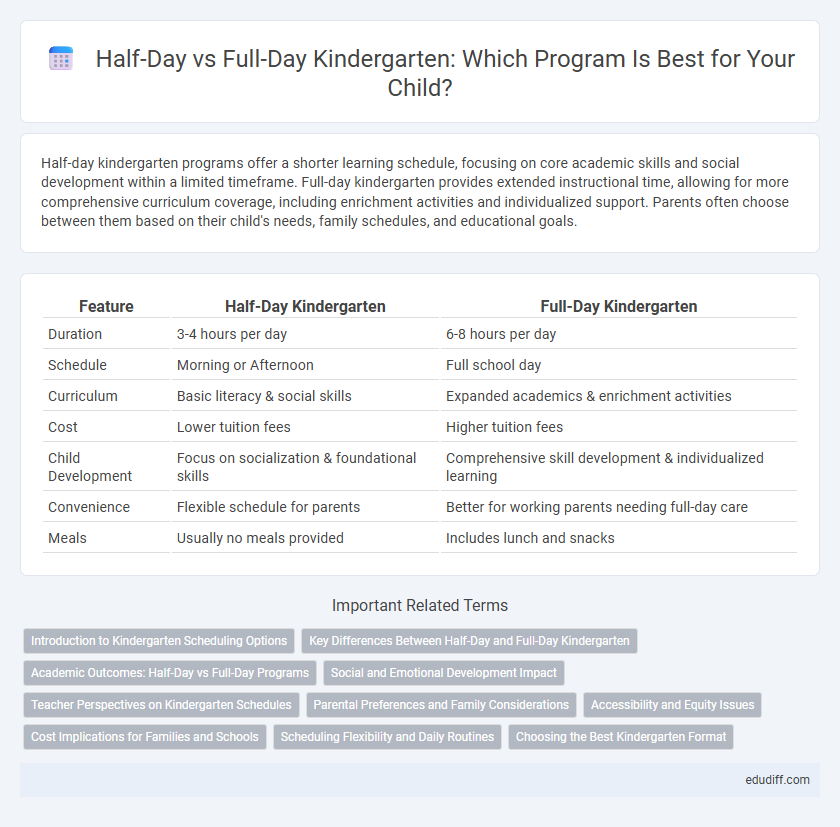Half-day kindergarten programs offer a shorter learning schedule, focusing on core academic skills and social development within a limited timeframe. Full-day kindergarten provides extended instructional time, allowing for more comprehensive curriculum coverage, including enrichment activities and individualized support. Parents often choose between them based on their child's needs, family schedules, and educational goals.
Table of Comparison
| Feature | Half-Day Kindergarten | Full-Day Kindergarten |
|---|---|---|
| Duration | 3-4 hours per day | 6-8 hours per day |
| Schedule | Morning or Afternoon | Full school day |
| Curriculum | Basic literacy & social skills | Expanded academics & enrichment activities |
| Cost | Lower tuition fees | Higher tuition fees |
| Child Development | Focus on socialization & foundational skills | Comprehensive skill development & individualized learning |
| Convenience | Flexible schedule for parents | Better for working parents needing full-day care |
| Meals | Usually no meals provided | Includes lunch and snacks |
Introduction to Kindergarten Scheduling Options
Half-day kindergarten programs typically run for two to four hours, focusing on foundational skills such as literacy, numeracy, and social interaction. Full-day kindergarten extends the schedule to six or more hours, offering a broader curriculum that includes enrichment activities like arts, physical education, and STEAM projects. Parents and educators choose between half-day and full-day options based on factors like child readiness, family schedules, and educational priorities.
Key Differences Between Half-Day and Full-Day Kindergarten
Half-day kindergarten typically runs for 2 to 4 hours and focuses on foundational skills such as socialization, basic literacy, and numeracy, while full-day kindergarten extends to 6 to 8 hours, allowing for a more comprehensive curriculum including art, physical education, and extended playtime. Full-day programs often provide greater opportunities for individualized instruction and development of cognitive and motor skills due to increased contact hours. Research indicates that full-day kindergarten can contribute to improved academic performance and better school readiness compared to half-day programs.
Academic Outcomes: Half-Day vs Full-Day Programs
Full-day kindergarten programs consistently show stronger academic outcomes, including enhanced language development, math skills, and social-emotional growth compared to half-day programs. Research indicates that full-day students achieve higher literacy and numeracy scores due to increased instructional time and enriched learning experiences. Extended exposure in full-day settings supports better school readiness, long-term achievement, and reduced achievement gaps among diverse student populations.
Social and Emotional Development Impact
Full-day kindergarten provides extended opportunities for children to engage in social interactions, fostering stronger peer relationships and emotional regulation skills compared to half-day programs. Research indicates that increased time in structured play and cooperative activities enhances children's empathy, self-confidence, and ability to manage stress. Consequently, full-day kindergarten contributes significantly to social competence and emotional resilience during early childhood development.
Teacher Perspectives on Kindergarten Schedules
Teachers in full-day kindergarten programs observe enhanced opportunities for in-depth instruction and individualized student support compared to half-day schedules. Full-day schedules allow educators to implement diverse learning activities and provide more consistent social-emotional development guidance. Conversely, some teachers note that half-day kindergarten can reduce student fatigue and maintain higher engagement during shorter sessions.
Parental Preferences and Family Considerations
Parental preferences for half-day versus full-day kindergarten often depend on family work schedules and childcare availability, with many parents favoring full-day programs for consistent supervision and enhanced early learning opportunities. Families with flexible work arrangements or those seeking gradual transitions for children may prefer half-day kindergarten, valuing shorter school hours to balance home routines. Considerations around transportation, extracurricular activities, and costs also influence decisions, making full-day kindergarten a popular choice among dual-income households prioritizing convenience and comprehensive educational exposure.
Accessibility and Equity Issues
Half-day kindergarten often limits access for working families, exacerbating equity gaps among low-income households that cannot afford additional childcare. Full-day kindergarten programs provide extended learning opportunities and stable supervision, promoting equal educational access and supporting children's developmental needs regardless of socioeconomic status. Ensuring universal availability of full-day kindergarten helps address disparities in early childhood education and fosters inclusive community growth.
Cost Implications for Families and Schools
Half-day kindergarten programs typically reduce costs for families by minimizing tuition fees and transportation expenses while allowing schools to allocate resources across more students. Full-day kindergarten involves higher operational costs for schools due to extended staffing, utilities, and facility maintenance, which often translate into increased fees for families. Budget considerations impact enrollment decisions, with full-day programs offering comprehensive learning but requiring greater financial commitment from both families and educational institutions.
Scheduling Flexibility and Daily Routines
Half-day kindergarten offers greater scheduling flexibility for families with variable work hours, typically lasting around three hours and allowing time for naps or home activities in the afternoon. Full-day kindergarten runs approximately six to eight hours, providing a structured routine with extended learning, playtime, and meals, which supports working parents and consistent daily engagement. Both formats adapt daily routines to balance educational activities and rest, but full-day programs emphasize comprehensive development through longer, continuous sessions.
Choosing the Best Kindergarten Format
Choosing between half-day and full-day kindergarten depends on family needs and child development goals. Full-day kindergarten offers extended learning time, fostering social skills and academic growth, while half-day programs provide a balanced schedule suited for younger children's attention spans. Evaluating factors such as childcare availability, curriculum intensity, and the child's readiness helps determine the best kindergarten format.
Half-day kindergarten vs Full-day kindergarten Infographic

 edudiff.com
edudiff.com